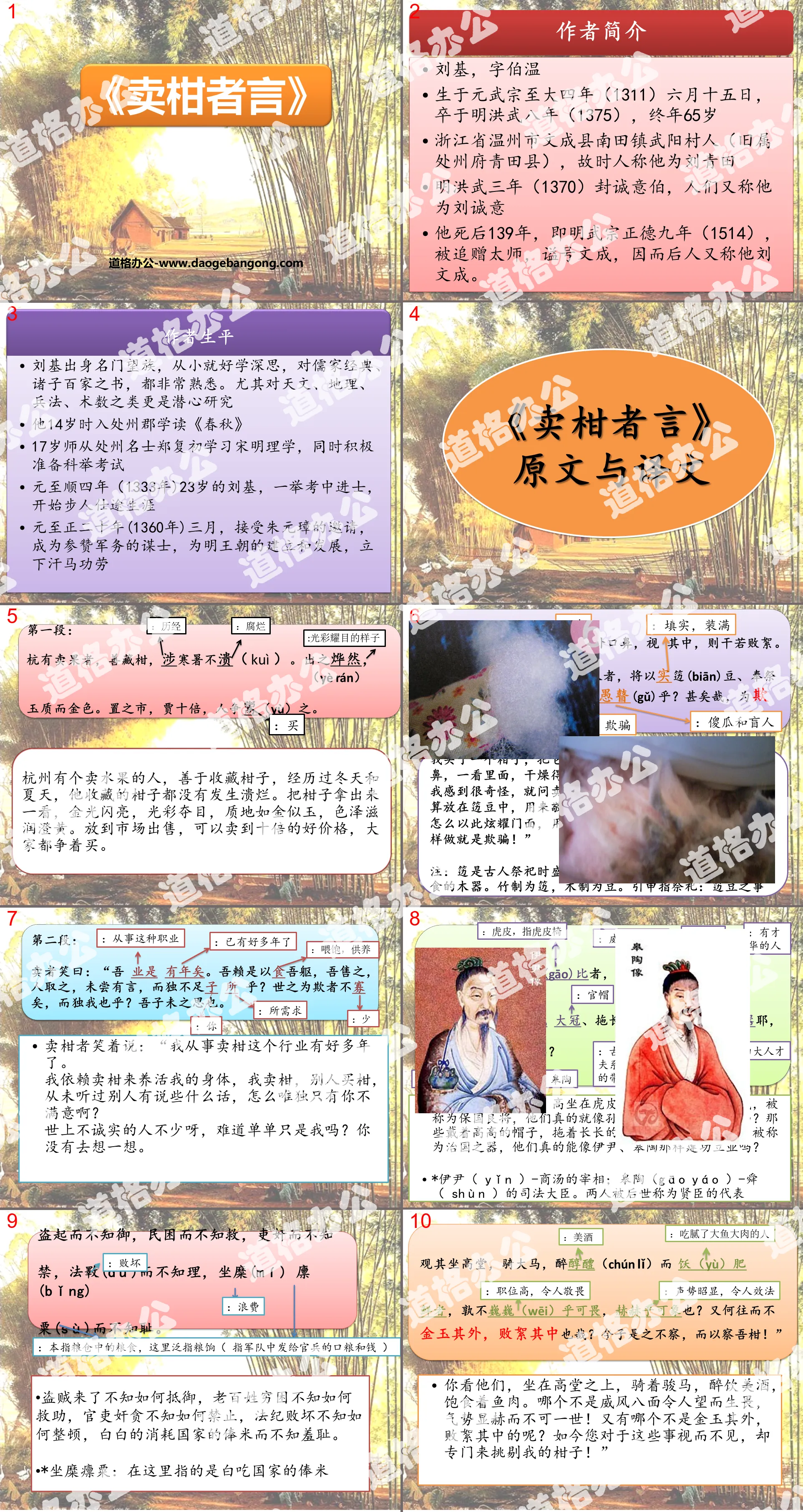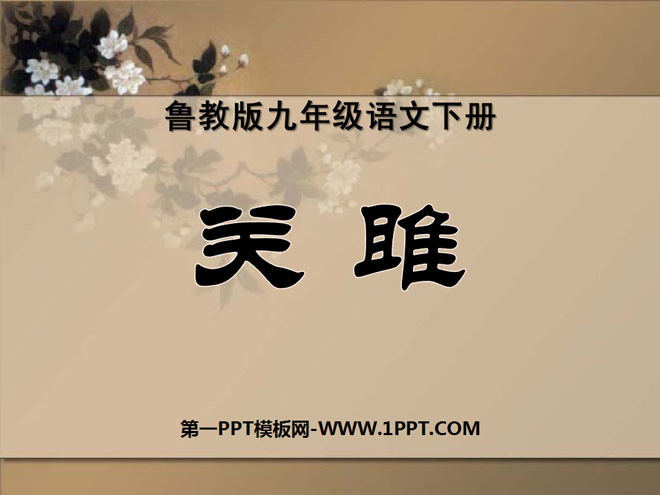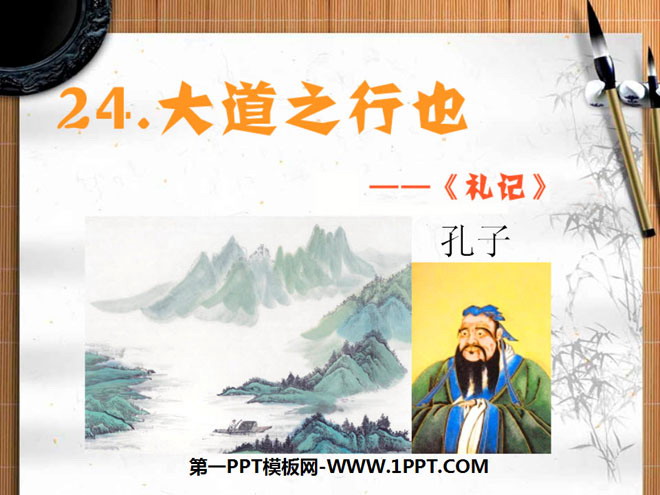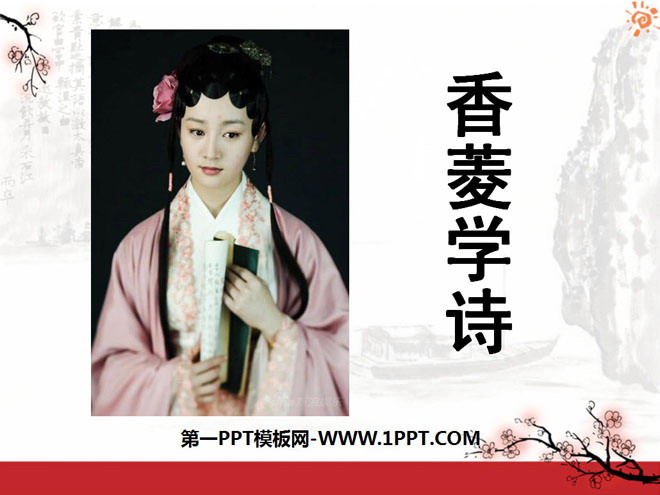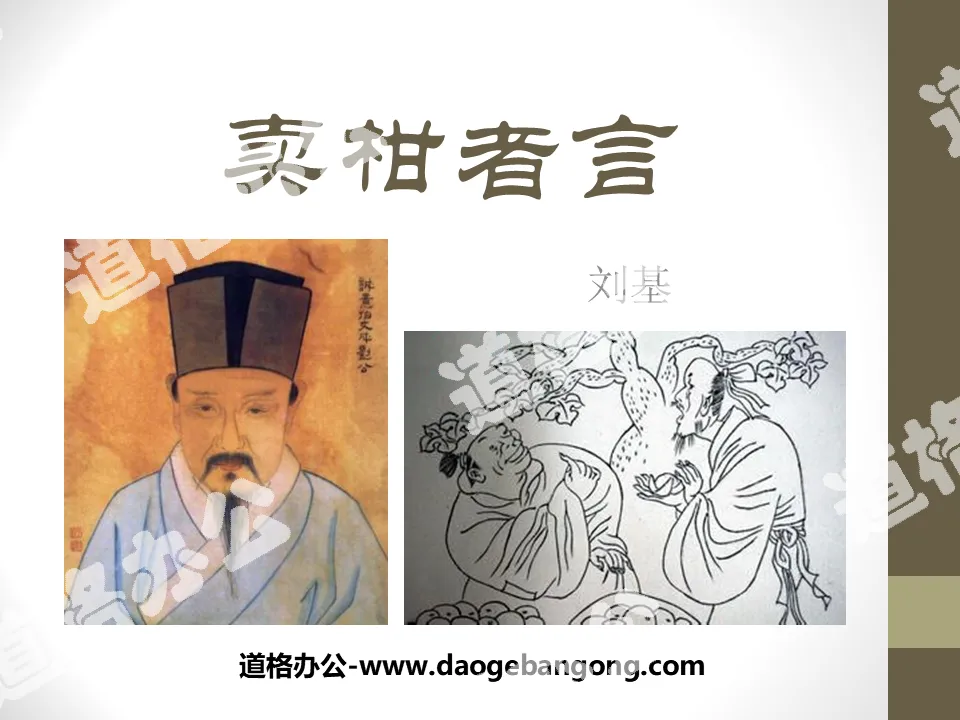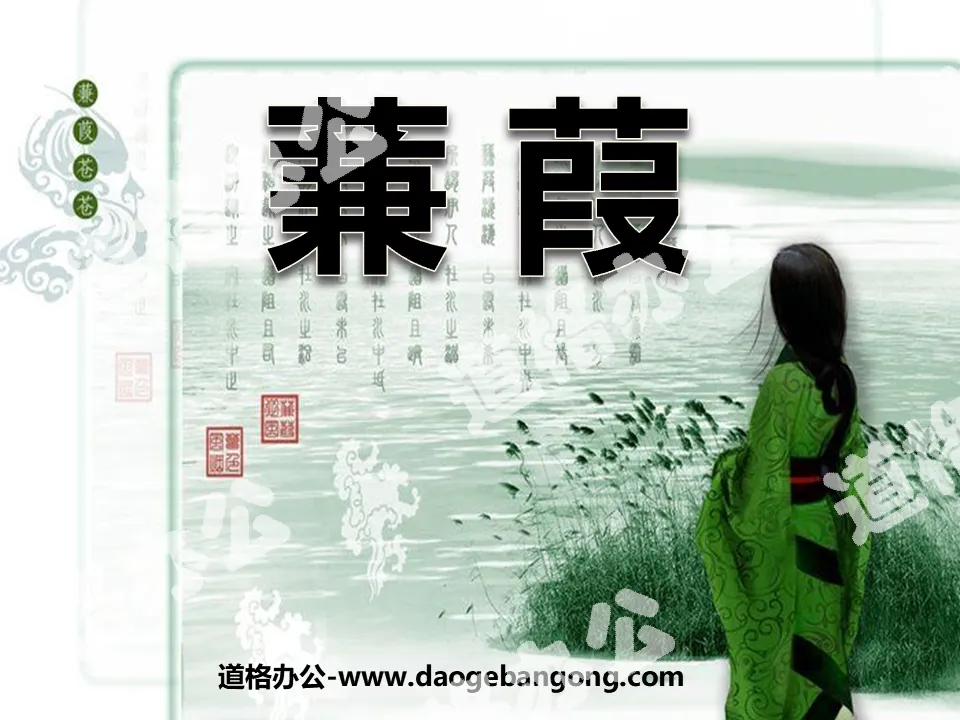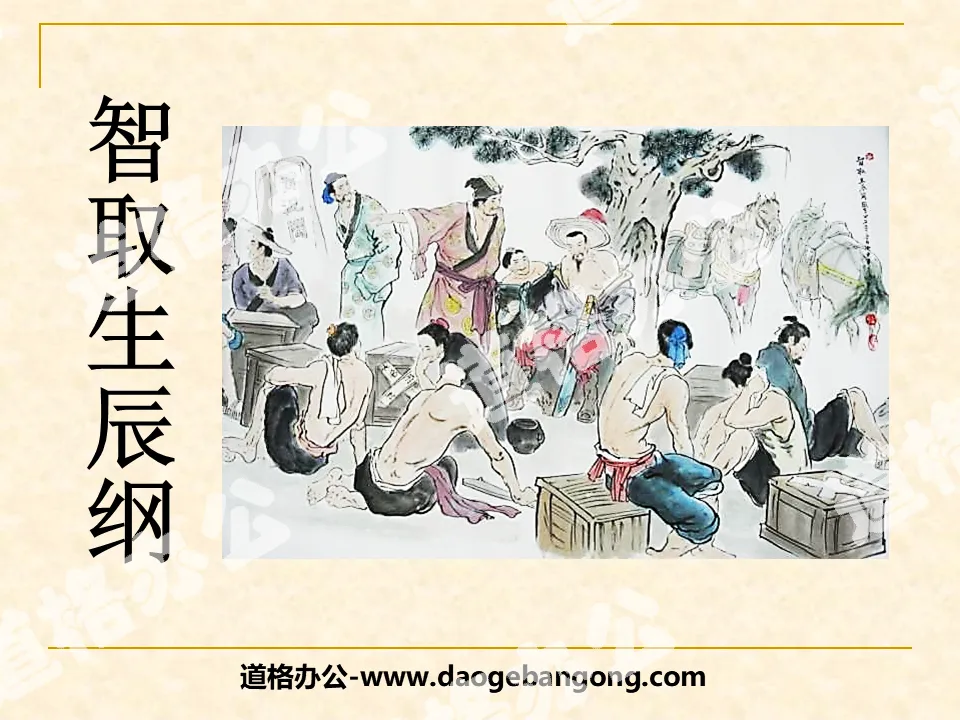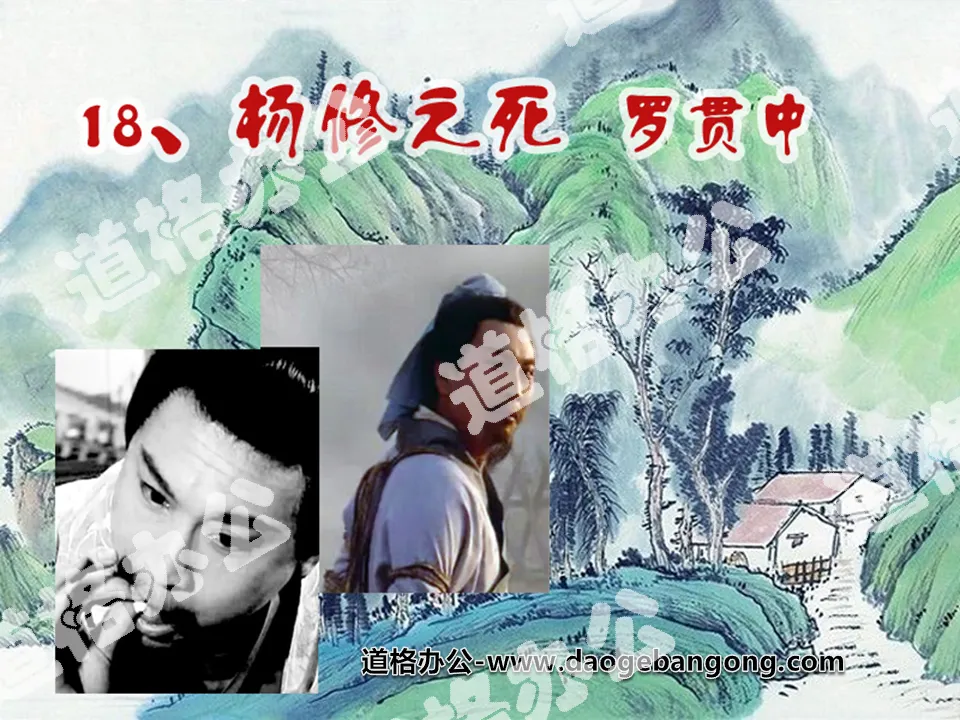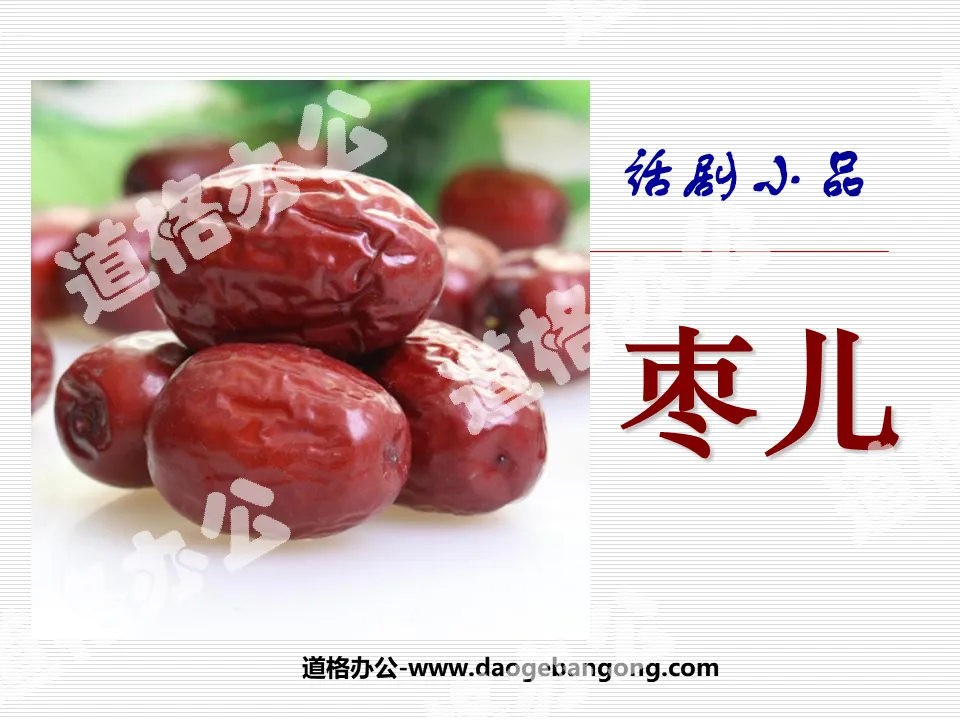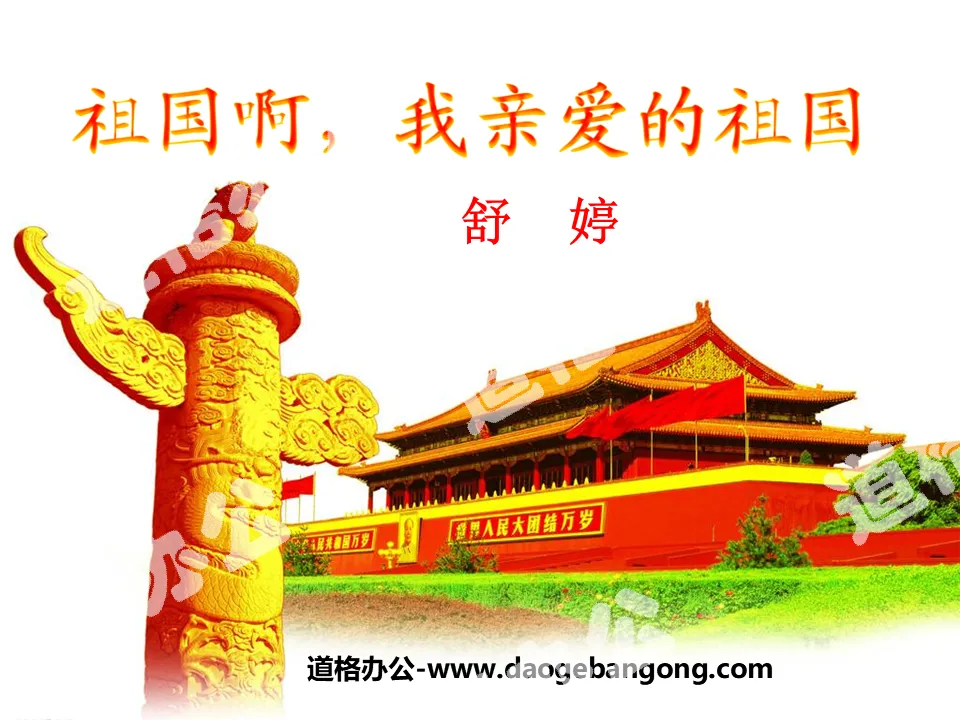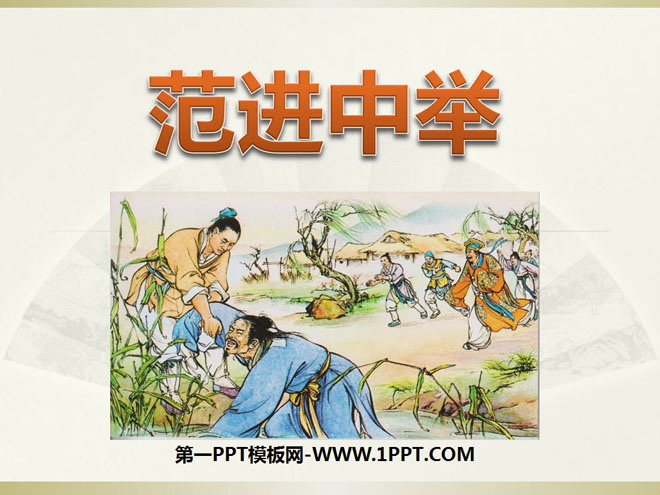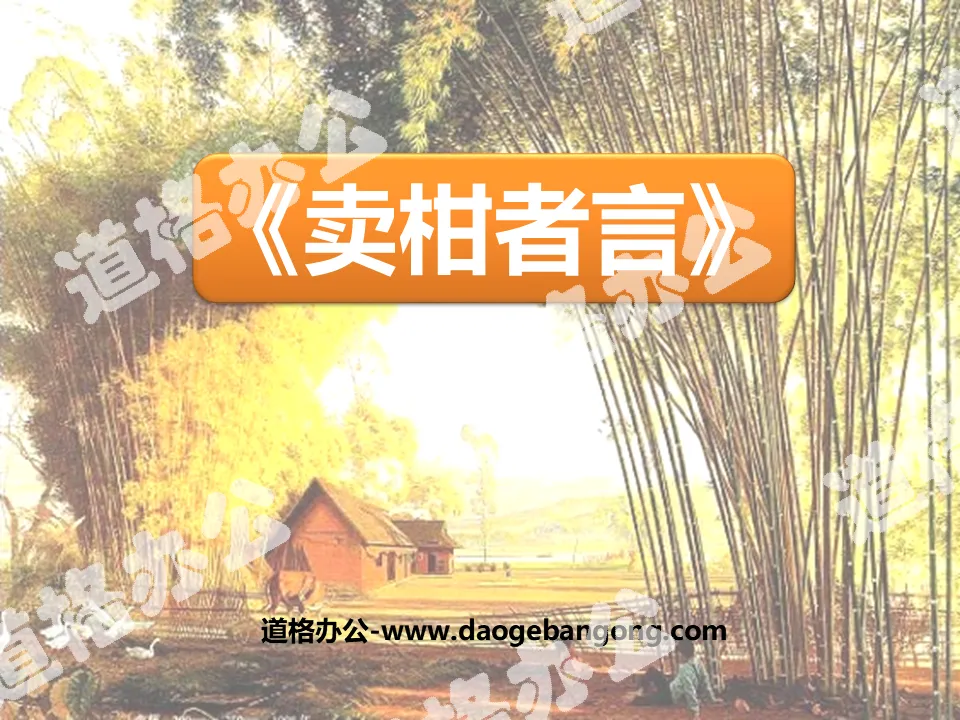
| Category | Format | Size |
|---|---|---|
| The second volume of the ninth-grade Chinese version of Lujiao Edition | pptx | 6 MB |
Description
"Words from the Man Who Sells Oranges" PPT Courseware 2
About the Author
Liu Ji, courtesy name Bowen, was born on June 15, the fourth year of Zhida in the Yuan Dynasty (1311), and died in the eighth year of Hongwu in the Ming Dynasty (1375), aged 65.
He was born in Wuyang Village, Nantian Town, Wencheng County, Wenzhou City, Zhejiang Province (formerly Qingtian County, Chuzhou Prefecture), so people called him Liu Qingtian at that time.
In the third year of Hongwu in the Ming Dynasty (1370), he was granted the title of Uncle Chengyi, and people also called him Liu Chengyi.
139 years after his death, that is, the ninth year of Zhengde of Emperor Wuzong of the Ming Dynasty (1514), he was posthumously awarded the title of Grand Master, with the posthumous title of Wencheng, so later generations also called him Liu Wencheng.
Author's life
Liu Ji was born in a distinguished family. He was fond of learning and thinking since he was a child. He was very familiar with Confucian classics and the books of various schools of thought. In particular, he devoted himself to the study of astronomy, geography, art of war, and arithmetic.
When he was 14 years old, he went to the prefecture and county to study "Spring and Autumn"
At the age of 17, he studied Neo-Confucianism in the Song and Ming Dynasties under Zheng Fuchu, a famous scholar from Chuzhou, and at the same time actively prepared for the imperial examination.
In the fourth year of Yuan Zhishun (1333), 23-year-old Liu Ji passed the Jinshi examination in one fell swoop and began his official career.
In March of the 20th year of Yuan Zhizheng (1360), he accepted Zhu Yuanzhang's invitation and became a military counselor, making great contributions to the establishment and development of the Ming Dynasty.
Content points
Criticize the mandarin orange sellers for not seeing the appearance of the mandarin oranges, and the mandarin orange sellers deceiving customers.
Pointing out the similarity between "gan" and the civil and military officials in the late Yuan Dynasty constitutes irony, and further pointed out that incompetent senior officials caused the darkness of political corruption.
central idea
This article is an allegorical prose, which aroused discussion from the trivial matter of buying and selling a spoiled tangerine. The words of the person who pretended to sell the tangerine revealed the social reality of the time when thieves were in full swing, officials were corrupt, the legal system was corrupt, and the people were living in dire straits. It effectively satirized those who were struggling to survive. The minister of civil and military affairs said that they were liars who deceived the world and stole reputations with "gold and jade on the outside, but ruin on the inside". They ruthlessly exposed the corruption and maladministration of the rulers in the late Yuan Dynasty and expressed their cynicism.
Clear levels: the full text is divided into four stages
The first stage is to write that the appearance of citrus fruits has the beauty of gold and jade, and people rush to buy it. (Introduction to the full text)
The second stage is to write about the scene after cutting open the citrus. This is in stark contrast to the first natural stage, which blames the orange seller for his deception.
The third stage is to write a long discussion of the orange seller. Talking about military generals and civil servants, it reveals the "gold and jade" side of generals and ministers, and then uses five parallel sentences to reveal their "failure inside" essence.
The fourth stage: The author's thoughts on the man who sells tangerines, using tangerines to satirize the world.
rhetorical questions and answers, rhetorical reasoning
This article adopts the form of rhetorical question and answer, cross-examination and reasoning, and uses the words of a man selling oranges to bitterly satirize the mediocrity and incompetence of military officers and civil servants, nakedly exposing their essence of "gold and jade on the outside, but failure on the inside".
"The Man Who Sells Oranges" uniquely creates suspense through rhetoric and cross-examination, inspiring readers' thinking to complete the argument and reasoning.
Specifically, it means questioning in asking questions and arguing in questioning. In this way, the strong emotional color (such as sarcasm, disdain, contempt, accusation) enhances the logical power of the article's argument, thus fully demonstrating the characteristics of literary and artistic essays that "all laughter and anger become articles".
sarcasm
This article uses tangerine as a satirical metaphor.
On the surface, the characters in the story are the author and the orange seller, but in fact, "the orange seller's words" are "the author's own words".
The analogy between things is that the appearance of Gan and bureaucrats are both "gold and jade on the outside", and their essences are also "failure on the inside". It is not just Gan, the real evil hearts are the military officers and civil servants in the court.
Sharp writing and concise language
Use concise words to outline the characters in action. The mandarin seller's accusation seemed justified, while the mandarin seller's reply was calm and impressive.
Example: The seller laughed and said: "My business has been around for a long time, and I rely on it to eat my body. I sell it, and others take it, without saying anything, but it is not enough for my son! There are many deceivers in the world." , and am I alone? I don’t even think about it!”
rhetorical question
A rhetorical question is a question without an answer, and the answer is implicit in the rhetorical question. People can understand the true meaning of the expresser from rhetorical questions.
Rhetorical questions are also called provocative questions, rhetorical questions, and cross-examinations.
In the questions and answers between buyers and sellers, a large number of rhetorical and rhetorical phrases are used. The rhetoric is strict and hearty, making the article full of ups and downs.
Example: "What if you sell it to others and use real beans to offer sacrifices to guests? Are you going to show off to fool the blind? What's more, it's deception!"
The author raises two thought-provoking questions:
Are you selling the tangerines to others to put them on plates to offer to gods and entertain guests?
Or is he showing off his appearance to deceive fools and blind people?
Two rhetorical questions are used here in succession, which strengthens the tone of the accusation and is aggressive, putting the seller in a dilemma where he has no words to answer.
parallelism
Use three or more phrases or sentences side by side with related or similar meanings, the same or similar structure, and the same tone to achieve an effect of strengthening the momentum.
The orange seller uses five parallels in a row to make the tone tight and aggressive.
example:
The robbers arose but did not know how to defend them, and the people were trapped but did not know how to save them.
The officials are traitorous but do not know the prohibitions, the law is corrupt but they do not know the principles;
Sitting on rice and grain without being ashamed.
Concise and concise language
The full text only uses more than 300 words, but it reveals the corrupt nature of the feudal ruling class, which is "gold and jade on the outside, but ruined on the inside." (It can be said to be a major social issue)
For example, when describing "mandarin orange", the author used words such as "it comes out brightly, jade-like and golden", "it's as dry as wadding", which accurately highlights the characteristics of the thing.
Language flexibility
At the beginning of the article, when writing "gan", use short declarative sentences, concisely and to the point.
Then "I asked about the strange thing", which is two sentences and one sigh, which is very layered.
The first sentence: State the facts and use a gentle tone.
Second sentence: Darkly highlight the word "bullying" in the next sentence, the meaning of accusation is clear.
The third sentence: An exclamation and a severe accusation seem to make the other party irrefutable.
But after the mandarin orange seller "laughed", he said something else: "My business has been around for a long time, and I rely on it to eat my body." He stated the facts directly and did not deny the issue of "bullying". .
In the second paragraph of the article, what are the "five ignorances" pointed out by the orange seller?
1. When thieves come, I don’t know how to resist them.
2. People are poor and don’t know how to help them.
3. I don’t know how to stop officials from committing adultery and corruption
4. The law and discipline are corrupt and I don’t know how to rectify it.
5. Spending the country’s salary in vain without shame
Please list the three meanings in the answer given by the orange seller.
The first level: Explain that there are people all over the world who deceive and deceive the world, so there is no need to make a fuss.
The second level: The deception of the feudal rulers, civil servants and generals, confirms his assertion that "there are many deceivers in the world." He also concluded that the corrupt nature of rulers is "gold and jade on the outside, but ruined on the inside."
The third level: counterattack against the author. The mandarin orange seller was very dissatisfied with the author for turning a blind eye to the extreme bullying in the world but instead finding fault with his mandarin oranges. The orange seller's counterattack left the author in a position where he was unable to refute.
Keywords: teaching courseware about the man who sells oranges, download the Chinese PPT courseware for the second volume of the ninth grade of the Lujiao edition, download the Chinese slide courseware for the ninth grade, download the PPT courseware about the man who sells oranges, .PPT format;
For more information about the PPT courseware "The Man Who Sells Mandarin Oranges", please click on the PPT tab of "The Man Who Sells Mandarin Oranges".
"Words from the Man Who Sells Oranges" PPT Courseware 5:
"Words from the Orange Seller" PPT Courseware 5 About the author Liu Ji (13211375) was a politician and writer in the late Yuan and early Ming dynasties. The courtesy name is Bowen, a native of Qingtian, Zhejiang. Jinshi at the end of the Yuan Dynasty. In the 20th year of Zhizheng of the Yuan Dynasty, he and Song Lian were summoned by Zhu Yuanzhang. They later became the founding heroes of the Ming Dynasty, were granted the title of Uncle Chengyi, and were promoted to imperial officials..
"Words from the Man Who Sells Oranges" PPT Courseware 4:
"Words from the Orange Seller" PPT Courseware 4 Teaching Objectives: Introduce the author, clear the text, and initially understand the content of the article. Accumulate classical Chinese vocabulary, summarize the theme of the article, and analyze the writing characteristics of the article. About the author Liu Ji (13211375) was a politician and writer in the late Yuan and early Ming dynasties. The word Bowen...
"Words from the Man Who Sells Oranges" PPT Courseware 3:
"Words from the Orange Seller" PPT courseware 3 1. Teaching objectives 1. Understand Liu Ji and his writing style. 2. Clear the text, master new words and difficult phrases in the text, and be able to translate the text literally. 3. Master grammatical phenomena such as polysemy, multiple words with one meaning, and ancient and modern synonyms in the text. two..
File Info
Update Time: 2024-06-27
This template belongs to Chinese courseware The second volume of the ninth-grade Chinese version of Lujiao Edition industry PPT template
"Words from the Man Who Sells Oranges" PPT Courseware 2 Simple campus recruitment activity planning plan summary enterprise and institution recruitment publicity lecture PPT template is a general PPT template for business post competition provided by the manuscript PPT, simple campus recruitment activity planning plan summary enterprise and institution recruitment promotion Lecture PPT template, you can edit and modify the text and pictures in the source file by downloading the source file. If you want more exquisite business PPT templates, you can come to grid resource. Doug resource PPT, massive PPT template slide material download, we only make high-quality PPT templates!
Tips: If you open the template and feel that it is not suitable for all your needs, you can search for related content "Words from the Man Who Sells Oranges" PPT Courseware 2 is enough.
How to use the Windows system template
Directly decompress the file and use it with office or wps
How to use the Mac system template
Directly decompress the file and use it Office or wps can be used
Related reading
For more detailed PPT-related tutorials and font tutorials, you can view: Click to see
How to create a high-quality technological sense PPT? 4 ways to share the bottom of the box
Notice
Do not download in WeChat, Zhihu, QQ, built-in browsers, please use mobile browsers to download! If you are a mobile phone user, please download it on your computer!
1. The manuscript PPT is only for study and reference, please delete it 24 hours after downloading.
2. If the resource involves your legitimate rights and interests, delete it immediately.
3. Contact information: service@daogebangong.com
"Words from the Man Who Sells Oranges" PPT Courseware 2, due to usage restrictions, it is only for personal study and reference use. For commercial use, please go to the relevant official website for authorization.
(Personal non-commercial use refers to the use of this font to complete the display of personal works, including but not limited to the design of personal papers, resumes, etc.)
Preview
